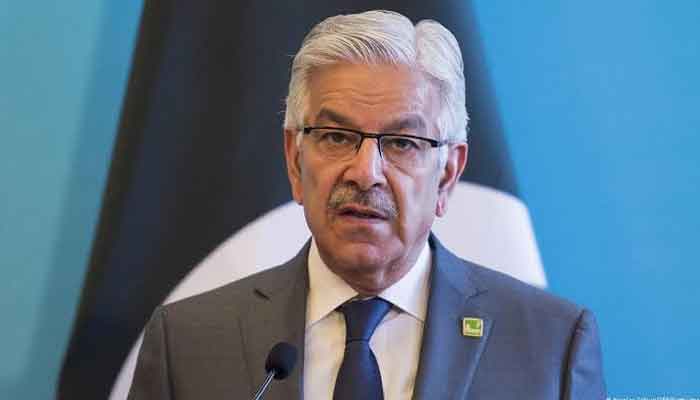No new military courts being established: Khawaja Asif
Defence minister claims attack on GHQ during May 9 protests included in India's anti-Pakistan objectives
Federal Minister for Defence Khawaja Asif on Sunday reiterated that no new military courts are being established to try the planners, instigators, abettors and perpetrators involved in the May 9 mayhem, confirming that the trials will be held in the existing courts.
The military's top brass had vowed to try protesters and their abettors under relevant laws, including the Pakistan Army Act and the Official Secrets Act, after Pakistan Tehreek-e-Insaf (PTI) workers and supporters stormed and vandalised the military installations on May 9 after the arrest of the former prime minister.
On Saturday, Chief of Army Staff (COAS) General Asim Munir said that the legal process of trial had commenced under Pakistan Army Act and Official Secret Act as per existing and established legal procedures derived from the Constitution.
Today, Asif — while addressing a rally of Pakistan Muslim League-Nawaz's (PML-N) taken out to express solidarity with the armed forces, in Sialkot — said that niether the fundamental rights were being taken away, nor will the law be used for political purposes.
"The evildoers who were spotted in the videos of attacks on military properties will be tried," he added.
'Attack on GHQ included in Indian goals'
The minister also said that the attack on General Headquarters (GHQ) during the May 9 violent protests — motivated by Khan's arrest — was included in India's anti-Pakistan objectives.
"Pakistan's existence was attacked on May 9. A person [Imran Khan] made this attack just for the sake of his power," Asif said.
He regretted how the families and heirs of the martyred would have felt when a group of vandals attacked the sacred monuments,
"I never doubt anyone's loyalty but I doubt the intentions of those who led the attacks on May 9," Asif said.
Earlier, the minister visited the Yadgar-e-Shuhada (martyrs monument) in Chawinda and laid a floral wreath on the graves of the martyrs before offering fatiha.
He said that they had visited the martyrs monument to remember their bravery in defeating Indian army
"I pay tribute to those who sacrificed [their lives] to defend the country," Asif said.
He criticised without naming anyone that a political leader was targetting the armed forces of Pakistan in the current situation.
"They are including external elements in targeting the armed forces," he said, urging the people to express their love for the army in its actual sense and discard the impression of what happened on May 9.
Asif said that the Pakistan Army was still standing firm like a mountain today, while the brave soldiers are laying their lives for the beloved country.
He said that there was a need to express solidarity in recognition of the sacrifices of Pakistan forces and to show unity among the nation.
"These people want to come into power again," he added.
May 9 protests
On May 9, protests erupted across Pakistan after Khan was arrested as he appeared before the Islamabad High Court for several cases pending since he was ousted last year.
The workers also damaged public property and set police vehicles on fire in Charsadda, Karachi, Lahore, and several other cities after the party called on supporters to "shut down Pakistan" over his arrest.
At least 10 people were killed and dozens of others sustained injuries during the days-long protests with internet services also remaining suspended for over 72 hours across the country.
In their bid to demand Khan’s release, the enraged mob attacked sensitive national institutions and buildings — including the GHQ and Corps Commander House (Jinnah House) — on May 9. The protesters also desecrated the martyrs’ monument and set Radio Pakistan’s building on fire.
To investigate attacks on civil and military properties, the Punjab government on May 13 decided to constitute a joint investigation team (JIT).
In a strong reaction, the military's top brass vowed on May 15 to try protesters and their abettors under relevant laws, including the Pakistan Army Act and the Official Secrets Act and dubbed May 9 as “Black Day”.
-
Security forces gun down 30 terrorists in multiple IBOs in KP: ISPR
-
MQM-P calls for new province in Sindh
-
US report validates Pakistan military edge over India: PM
-
Banned TTP poses serious threat to Pakistan security: UNSC panel
-
CM Afridi clarifies remarks on by-poll after ECP requests army deployment
-
Dubai sees 3.2m Pakistani passengers in 2025 as airport sets new milestone
-
Security forces kill 23 Indian proxy terrorists in KP's Kurram
-
Pakistan to construct island to boost oil exploration: report












